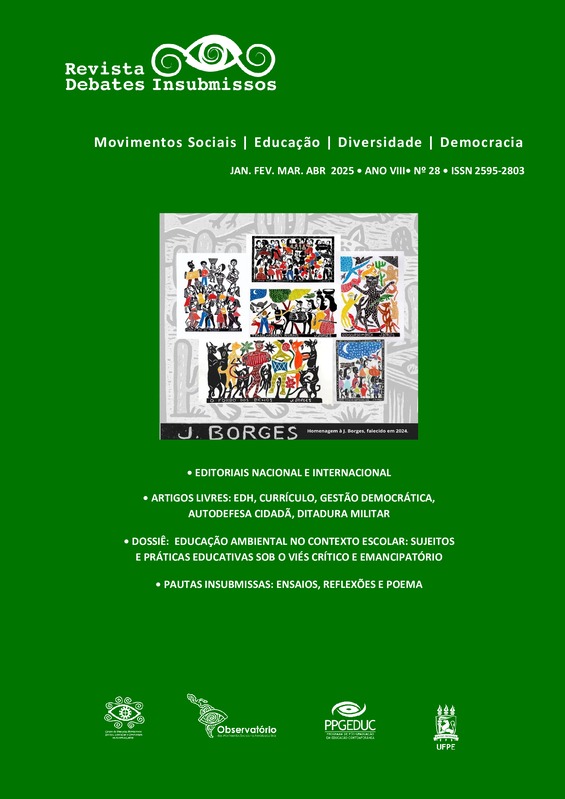UNDERSTANDING AS A TEACHING ATTITUDE IN THE PROCESS OF INTERDISCIPLINARY EDUCATION
DOI:
https://doi.org/10.32359/debin2025.v8.n28.p278-299Keywords:
Education, Senses of comprehension, InterdisciplinaryAbstract
This article aims to propose a discussion about the meanings of the word understanding, used by Morin (2015), in his book, Ensinar a Viver: Manifesto para mudar a educação, when reflecting on relationships in education, in a welcoming and interdisciplinary perspective remedying sensitive problems that affect dialogue between classes of teachers and students. Morin (2015), points to the difficulties encountered in Brazilian schools in the 21st century, resulting from misunderstanding and a lack of complex thinking that contributes to school failure. We chose as a methodology the descriptive analysis of data collected in an interview and online questionnaire, applied to two teachers, from the second Series of High School, from a school in the State Public Network of Teresina/PI. The analyzes revealed that the meanings of understanding are little differentiated by the teachers, although they recognize its importance as a dialogic piece for interdisciplinary and meaningful learning in the classroom.
References
DELORS, J. et al. Educação: um tesouro a descobrir: relatório para a UNESCO da Comissão Internacional sobre Educação para o Século XXI. São Paulo: Cortez; Brasília, DF: UNESCO, 1998.
FAZENDA, I. C. Integração e interdisciplinaridade no ensino brasileiro: efetividade ou ideologia. São Paulo: Loyola, 1979.
FREIRE, P. A Educação como Prática da liberdade.23ª. Ed.Rio de Janeiro: Paz e Terra, 1999.
FREIRE, P. Pedagogia da autonomia: saberes necessários à prática educativa. São Paulo: Paz e Terra, 1996.
FREIRE, P. Pedagogia do Oprimido. 22. ed. Rio de Janeiro: Paz e Terra, 1987.
LUCK, H. Pedagogia interdisciplinar,: fundamentos teórico-metodológicos. 18. ed., Petrópolis: Vozes, 2013.
MINAYO, M. C. de S. O Desafio do Conhecimento: pesquisa qualitativa em saúde. 10. ed. rev. e aprim. São Paulo: Hucitec, 2006.
MORIN, E. Ensinar a Viver: Manifesto para mudar a educação. Tradução: Edgard de Assis Carvalho e Mariza Perassi Bosco. – Porto Alegre: Sulina, 2015. 183p.
MORIN, E. Os sete saberes necessários à educação do futuro ; tradução de Catarina Eleonora F. da Silva e Jeanne Sawaya ; revisão técnica de Edgard de Assis Carvalho. – 2. ed. – São Paulo : Cortez ; Brasília, DF : UNESCO, 2000.
ARTIGO EM REVISTA
DILTHEY, W. A formação do mundo histórico nas ciências do espírito. In: Filosofia e Educação: textos selecionados. Org. e introdução de Maria Nazaré de Camargo Pacheco Amaral. São Paulo: Edusp, 2010, p.139-236.
THIESEN. J. da S. A interdisciplinaridade como um movimento articulador no processo ensino-aprendizagem. Revista Brasileira de Educação v. 13 n. 39. P. 545 - 598set./dez. 2008
DICIONÁRIO
FERREIRA, A. B. de H. Mini Aurélio: o dicionário da língua portuguesa. 8. ed. - Curitiba: Positivo, 2010, 960 p.: i
DOCUMENTOS NA INTERNET
BRASIL. Ministério da Educação. Base Nacional Comum Curricular. Brasília: MEC, 2018. Disponível em: http://basenacionalcomum.mec.gov.br/. Acesso em: 20/10/2023
Downloads
Published
How to Cite
Issue
Section
License

This work is licensed under a Creative Commons Attribution-NonCommercial-NoDerivatives 4.0 International License.



